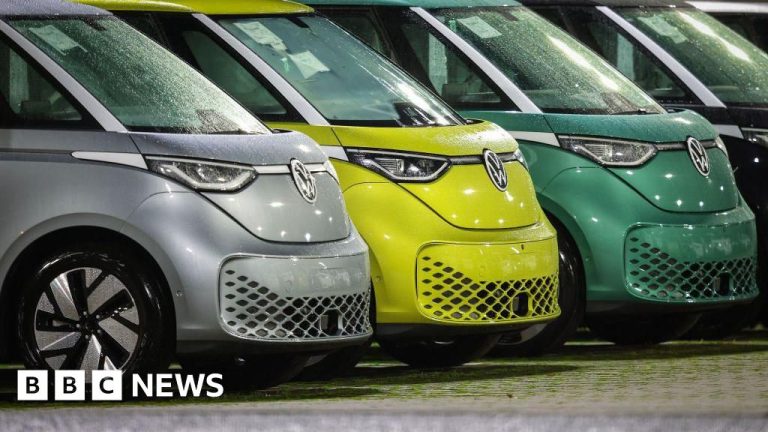Volkswagen has reached an agreement with the IG Metall union that will avoid factory closures in Germany and immediate compulsory layoffs.
However, both sides agreed to cut more than 35,000 jobs across the country in a “socially responsible” way by 2030, to save some €15 billion (£12.4 billion).
Germany's largest carmaker previously warned it may have to close factories in the country for the first time to cut costs.
After lengthy negotiations that began in September, the union said Friday that the two unions had “succeeded in finding a solution” that guarantees jobs and allows for future investments.
VW was considering closing up to three factories in Germany and had asked its workers to take a 10% pay cut.
At the time, the union demanded a 7% increase.
Although the deal will also result in a reduction in production capacity at its factories, it has been welcomed by union leaders.
“No sites will be closed, no one will be made redundant for operational reasons and our company salary agreement will be guaranteed in the long term,” said Daniela Cavallo, chairwoman of the IG Metall works council.
“We have found a solid solution in the most difficult economic conditions,” she added.
The 35,000 job losses by 2030 should be resolved through different solutions such as the early retirement proposal.
Under the terms of the agreement, a previously agreed 5% salary increase will also be suspended in 2025 and 2026.
The union said this would help “support the transformation” of the company.
The number of apprenticeships offered each year in Germany will also be reduced from 1,400 to 600 from 2026, and Germany will consider moving some of its production to Mexico.
It is also studying alternative options for its sites in Dresden and Osnabrück.
But Oliver Blume, chief executive of the VW Group, said in a statement that the deal was “an important signal for the future viability of the Volkswagen brand.”
Factory closures in Germany would have been unprecedented in the history of the manufacturer.
VW, like other German automakers, has been hit hard by falling demand for its cars in China, a previously lucrative market.
At the same time, Chinese brands are establishing themselves in Europe, increasing competition for sales.
During the negotiations, some 100,000 workers took part in short “warning strikes” at sites across the country, to put pressure on company management.
The latest round of negotiations began on Monday, with negotiators apparently determined to resolve the issues before Christmas.
German Chancellor Olaf Scholz also welcomed the announcement, calling it a “good, socially acceptable solution.”

